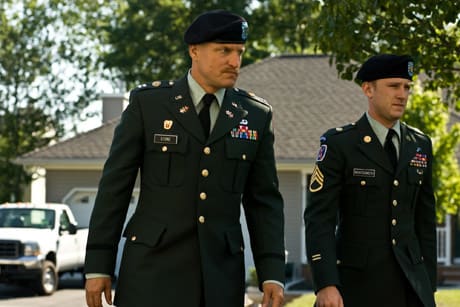Having previously flexed his screenwriting muscles on titles such as Married Life and Jesus' Son, first time director Oren Moverman has a knack for presenting the cinematically rote and familiar with a profound insight that manages to reveal both the comic and tragic humanity of the quotidian. It's an impressive skill that serves The Messenger well, given how tired and well tread the central narrative of an emotionally damaged soldier acclimating back into his native land truly is.
The soldier of interest here is Staff Sergeant Will Montgomery (Ben Foster), a war hero assigned the undesirable detail of advising families that their loved ones have died in combat. As he is such a taciturn and visibly damaged man, medicating through alcohol and aggressive music, this emotional assignment proves nothing if not contradictory, which is only exaggerated by the rigidity and humourlessness of his partner in this, Captain Tony Stone (Woody Harrelson).
Normally, the juxtaposition of a reckless and damaged man with one of a straight-laced nature would lead to corny catharsis and a clumsy change of heart, but here, grounded by an Oscar-nominated screenplay free from moral superiority and sharp, naturalistic performances, things develop organically. It still goes through the developmental motions at the appropriate narrative intervals, with inevitable conflicts leading to understanding and a deepened bond, but it never feels forced or factitious.
Even the central moral quandary of the film, wherein Montgomery develops an inappropriate relationship with a grieving widow (played by Samantha Morton) to whom he delivered bad news, seems sincere, shown with awkward silence and a believable sense of connection through shared abandonment and isolation.
What is most striking about this slight but powerful take on coping is the range of emotions conveyed in the many death notices that Montgomery and Stone bestow. Some people respond by breaking down, others with aggression and others with surprising calm, all while the film captures the sheer intensity of the situation, whether it's devastation or awkward comedy. Like everything else, these moments are impressively balanced, solidifying that this is character-based filmmaking at its strongest.
(Alliance)The soldier of interest here is Staff Sergeant Will Montgomery (Ben Foster), a war hero assigned the undesirable detail of advising families that their loved ones have died in combat. As he is such a taciturn and visibly damaged man, medicating through alcohol and aggressive music, this emotional assignment proves nothing if not contradictory, which is only exaggerated by the rigidity and humourlessness of his partner in this, Captain Tony Stone (Woody Harrelson).
Normally, the juxtaposition of a reckless and damaged man with one of a straight-laced nature would lead to corny catharsis and a clumsy change of heart, but here, grounded by an Oscar-nominated screenplay free from moral superiority and sharp, naturalistic performances, things develop organically. It still goes through the developmental motions at the appropriate narrative intervals, with inevitable conflicts leading to understanding and a deepened bond, but it never feels forced or factitious.
Even the central moral quandary of the film, wherein Montgomery develops an inappropriate relationship with a grieving widow (played by Samantha Morton) to whom he delivered bad news, seems sincere, shown with awkward silence and a believable sense of connection through shared abandonment and isolation.
What is most striking about this slight but powerful take on coping is the range of emotions conveyed in the many death notices that Montgomery and Stone bestow. Some people respond by breaking down, others with aggression and others with surprising calm, all while the film captures the sheer intensity of the situation, whether it's devastation or awkward comedy. Like everything else, these moments are impressively balanced, solidifying that this is character-based filmmaking at its strongest.
